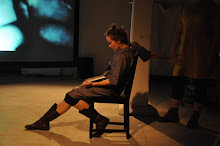Anne LeBaron presented this past Friday to a (rather poorly -- yikes!) attended colloquium in Fulton Hall. The subject: her opera, Sucktion. LeBaron's work sounds immediately fascinating. Here's a random selection from her very impressive CV: she won a Guggenheim, studied with Ligeti (not in that order), has written a "dance opera" called Pope Joan, and Wet, another opera about the big business of water and the horrors of floods and she, I'm quoting, lectures at CalArts on the "concept of HyperOpera." (I don't know what this means but surely it is meant to address the hyper, erratic, overblown aspect of opera--aspect, or sine qua non--that is, the histrionic too-muchness of opera, perhaps in order to address what happens when the "Opera/Too-much" dial continues to be turned even further up, up, up?)
In the beginning of her lecture Anne charmed us by revealing a years-long fascination with old vacuum cleaners and vacuum cleaner sounds. She played us early samples of her work, female vocalizations layered on top of recorded & processed vacuum sounds. At times the two seemed uncannily to merge, and at one point, LeBaron had the vocalist spit and buzz into the vacuum mouthpiece to produce a series of fun sounds that would probably make Kaija Saariaho jealous. LeBaron's collaborators on Sucktion include the poet Douglas Kearney, whose libretto is a clever homage to Marinetti typeface. This all seemed promising.
LeBaron saved the nugget of her presentation for last -- that is, the semi-finished, workshop staging of the opera in L.A. But this is where things started to go downhill. LeBaron later mentioned she feared that 40 minutes of vacuum sounds weren't in and of themselves interesting enough to justify the ticket prices (okay, I made that part up, but she did say she was worried the vacuuming lacked moxy) so she crafted a heavy-handed scenario to go along with them. (For the record, vacuum sounds are TOTALLY interesting. Maybe not for forty minutes, sure, but for at least 25. If John Cage can get away with Points in Space, I say go for it!)
Oppressed housewife cleans house, anticipating the arrival of her husband home from work. (The singer/actress in this case was Asian, and one grad student floated the thought that LeBaron intended the opera as a critique of interracial marriage. Or better, I thought, that the Mail Order Bride phenomenon in this country replicates/updates in the 21st century the phenomenon of the overbored, undersexed housewife of the 1950s? But LeBaron seemed uninterested; or else this was my private flight of fancy. Anyway.)
The husband arrives home (a recorded voice-over, "Honey, I'm Home"; i.e. there is no "husband"), finds the place a mess & retires for the night. Depressed, the housewife turns melancholy. A vacuum arrives. A present from her hubby. She falls in love (with the vacuum), sprawls on it orgasmically and thus the comedy endeth.
To put it simply, the problem? Too much scenario and too literal.
1. Put the husband in a locked closet stage left so that the "housewife" (or is she a dominatrix? an updated Alcina?) controls his exits and entrances.
2. Or make it Erwartung Appliance! Instead of losing her fiancé, this poor woman is in denial over the death of her beloved vacuum.
3. Or make the husband's cleanliness phobia the center of the (o_p)/e(r?)a and his hapless wife the Mrs. Haversham of the Ace Hardware Cleaning aisle.
A dash of the intellectual wit that has made LeBaron such a successful composer and a writer is needed. Instead, the staging we saw consisted of the soprano (who, by the way, is a musicologist and member of the group that commissioned the opera) putting on and taking off rubber gloves, stuffing them into her oversize apron pockets, dropping them, and putting them on again. LeBaron's score, and her ideas, play happily far off of the beaten path. But this opera needs a director so that the curiosity that motivated its inception gets taken up a notch. Staging, to honor its points of origin (the ideation of the opera, the wit and spirit of adventurousness that composers like LeBaron bring to the table), should amplify, qualify & problematize that origin; not bow to it.
Subscribe to:
Post Comments (Atom)




No comments:
Post a Comment